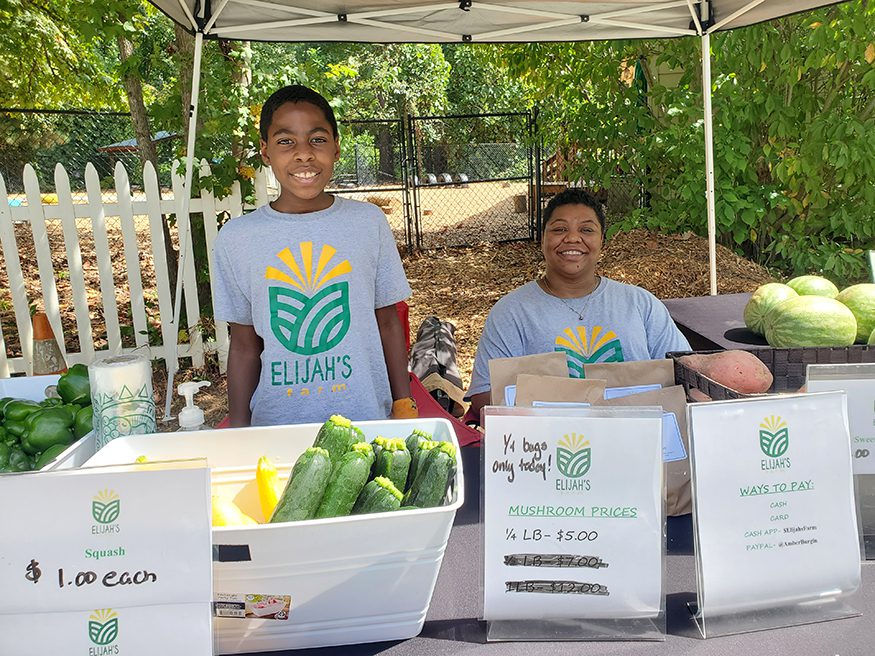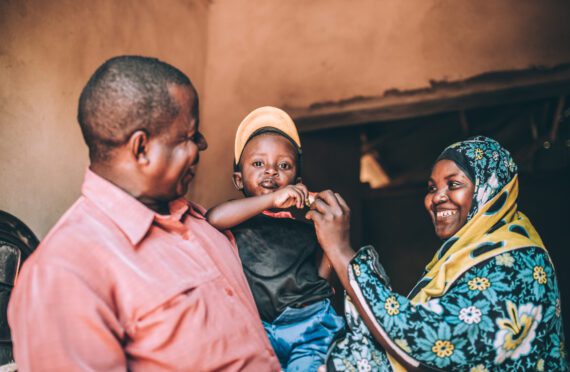By Todd Post
Amber Burgin-Brothers is a farmer in Orange County, North Carolina, part of the Piedmont region of the state known for its rolling hills and fertile soil. She started Elijah’s Farm, named after her son, in 2019, raising organic produce and herbs. Her specialty is mushrooms—many varieties of mushrooms. The colors and arrangements of the mushrooms could easily lead one to mistake them for works of art.
Burgin-Brothers is part of a group of several Black female farmers who want to remake their local food system to give more people access to fresh, healthy foods. Access is a particular problem for Black households and others of color, and Burgin-Brothers and her peers in the Culinary Femme Collective are working to fix this problem.
In 2021, she joined the Black Farmers Market, a community-centered marketplace with locations in Durham and Raleigh, where a sign informs customers, “Your Blackness is Welcome Here.” Shopping at the market keeps dollars circulating in the community and supports local Black farmers and other food suppliers.
Burgin-Brothers has always enjoyed sinking her hands into soil and coaxing seeds to sprout, though she took up farming in a more formal sense just a few years ago. She gained her appreciation for growing things from her mother, who grew much of the family’s food in their yard—along with plenty more to feed neighboring families who could not afford to purchase enough food.
A psychologist by training, Burgin-Brothers works at the Emily K Center in Durham, a nonprofit organization dedicated to preparing students who are traditionally underrepresented for higher education, helping them build academic and life skills to achieve postsecondary success and be agents of change in their communities.
She holds a Master of Divinity from the Duke Divinity School, and it was when she was approaching graduation from Duke and contemplating her spiritual path that she decided she wanted to farm. “It is my calling,” she says, and just listening to her, it is clear why. She waxes eloquent when discussing the spiritual fulfillment that she feels working on the farm, the direct access to the miracle of creation through the cycle of birth, death, and resurrection in nature.
For Burgin-Brothers, the spiritual path was about to converge with food justice advocacy. She is keenly aware of the harms caused by food apartheid to communities of color. The effect on children in particular, including their ability to achieve their potential in school, is something she confronts regularly in her work at the Emily K Center.
As Burgin-Brothers prepared to complete her degree program at Duke, the Black Lives Matter movement was on the minds of many of the students in her graduating class. They felt that it was a necessity to align their spiritual path with racial justice.
Remaking a local food system isn’t as simple as opening a farmers market in an underserved community. The challenges are bigger than proximity to food. Many people, especially those from younger generations, do not know how to prepare the fresh produce sold at farmers markets. This is a byproduct of food apartheid, which is pervasive in communities of color.
Some describe these communities as food deserts because of the lack of grocery stores and supermarkets. Burgin-Brothers prefers the term food swamps. She says that there may be plenty of food available, but it’s not the right food—food that promotes good health and enables people to be productive at school or work. The abundance of cheap fast food and heat-and-eat products laced with myriad chemical additives has made it too easy for people to eschew cooking altogether.
Burgin-Brothers may get discouraged, but she is hardly deterred. Once again, she draws a lesson from her mother’s playbook. When she was growing up, her mother worked as a WIC counselor and taught cooking classes, making the rounds of housing projects to demonstrate how to prepare a meal on a tight budget with fresh ingredients. Times have changed, and there are very few WIC cooking classes anymore, but Burgin-Brothers is using new methods and tools that her mother’s generation lacked to reach the same goals. She is using social media to teach shoppers how to prepare foods like squash and eggplant that used to be staples in their grandmothers’ kitchens.
Burgin-Brothers’ immediate hope is that the long overdue federal investments in expanding rural broadband will finally come through. The $1.2 trillion bipartisan Infrastructure Investment and Jobs Act includes $65 billion to make broadband available nationwide, closing a digital divide for rural areas, low-income families, and tribal communities. Broadband gives her a way to connect with people in her community, and this connection is central to how she thinks about remaking local food systems. She cultivates connection both online and in person at her farmers market, and in 2022, she will have access to a mobile farmers market trailer with refrigeration that will enable her to transport, store, and sell fresh produce.
Todd Post is senior researcher, writer, and editor with Bread for the World.



